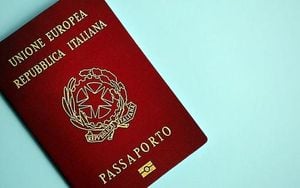In a series of controversial deportations, multiple migrants recently returned to the United States after being flown to El Salvador under the Trump administration, claiming that Salvadoran authorities refused to accept them.
The situation arose when President Donald Trump invoked the Alien Enemies Act, a rarely used wartime law from the 18th century, amid rising tensions around immigration policy. This legal authority has become the focal point of a significant legal battle, particularly as Judge James Boasberg reviews allegations of violations surrounding these deportations.
The plight of these Venezuelan migrants was brought to light through testimony submitted to the court. One woman, a Venezuelan national, recounted her experience and that of seven other women who were returned to the U.S. upon landing in El Salvador. “I was told that the President of El Salvador would not accept women,” she said, highlighting the absurdity and injustice of the situation. Another migrant from Nicaragua echoed these sentiments, stating he overheard a Salvadoran official inform Immigration and Customs Enforcement (ICE) agents that El Salvador “would not detain someone from another Central American country because of the conflict it would cause.”
These declarations were filed in conjunction with Judge Boasberg's consideration of the legality of the administration's actions, particularly concerning the court order he issued on March 15. This order required any flights carrying Venezuelans deported based on Trump’s proclamation of the Alien Enemies Act to return to the United States. However, the government had already initiated certain flights by the time the judge issued his directive.
In response to the court order, the Trump administration argued that complications such as “serious national security, safety, regulatory, and logistical problems” hindered the feasibility of reversing the planes mid-air. However, the migrants' attorneys contended that the experiences of their clients illustrate a differing narrative, asserting that logistical concerns were exaggerated. In fact, as the Venezuelan woman disclosed, after takeoff from Laredo, Texas, she overheard officials discussing the judge's ruling, making clear that they were aware of it during the flight.
This legal case has unveiled serious questions around due process and the implementation of immigration laws, particularly as Judge Patricia Millett observed during a recent hearing. She drew historical comparisons, stating, “Nazis got better treatment under the Alien Enemies Act than what has happened here,” pointing to the comprehensive processes that existed during World War II, including pre-removal hearings. Much to her concern, many of the migrants did not receive adequate notice or understanding of their deportation status.
As the federal court grapples with these revelations, the Justice Department is pushing for the temporary restraining order imposed by Judge Boasberg to be overturned. This pause on deportations is pivotal, as it impacts approximately 258 individuals, primarily alleged members of the Tren de Aragua gang, who are currently facing removal proceedings. The government insists that Boasberg's order represents an “unprecedented and enormous intrusion” on presidential powers.
While the appeals court has yet to make a definitive ruling on the matter, it’s clear that the legalities surrounding the recent deportations are far from straightforward. The Justice Department must contend with the notion that the constitutional due process rights of individuals should not be overridden by the powers invoked under the Alien Enemies Act. Judge Millett articulated this sentiment during the proceedings, emphasizing that the president must comply with constitutional laws just as any other citizen would.
As the debate around the legality and ethics of these deportations continues, Judge Boasberg subsequently maintained a 14-day pause on the administration's ability to deport any individuals under the Alien Enemies Act. He also highlighted the potential for extended injunctions as immigrant rights groups work to challenge the broader applicability of the law.
As the situation evolves, the plight of the deportees serves as a painful reminder of the complexities inherent in immigration policy and the often-hostile environment for vulnerable individuals seeking safety and stability. Both sides must navigate a convoluted legal landscape that, at times, appears contradictory and unjust.
Members of the Salvadoran army were recently photographed standing guard at the CECOT prison in Tecoluca, which adds a layer of urgency to an already tense environment in the region. As this drama unfolds within U.S. courts and in El Salvador, the world watches closely to see how the administration will balance its immigration priorities with fundamental legal principles.





